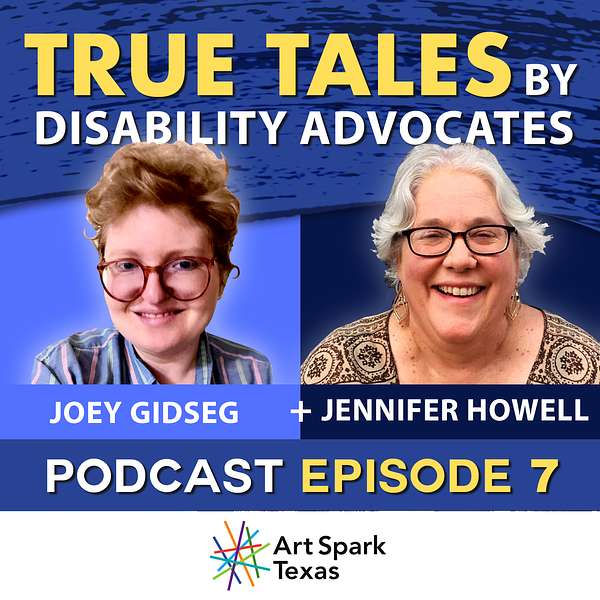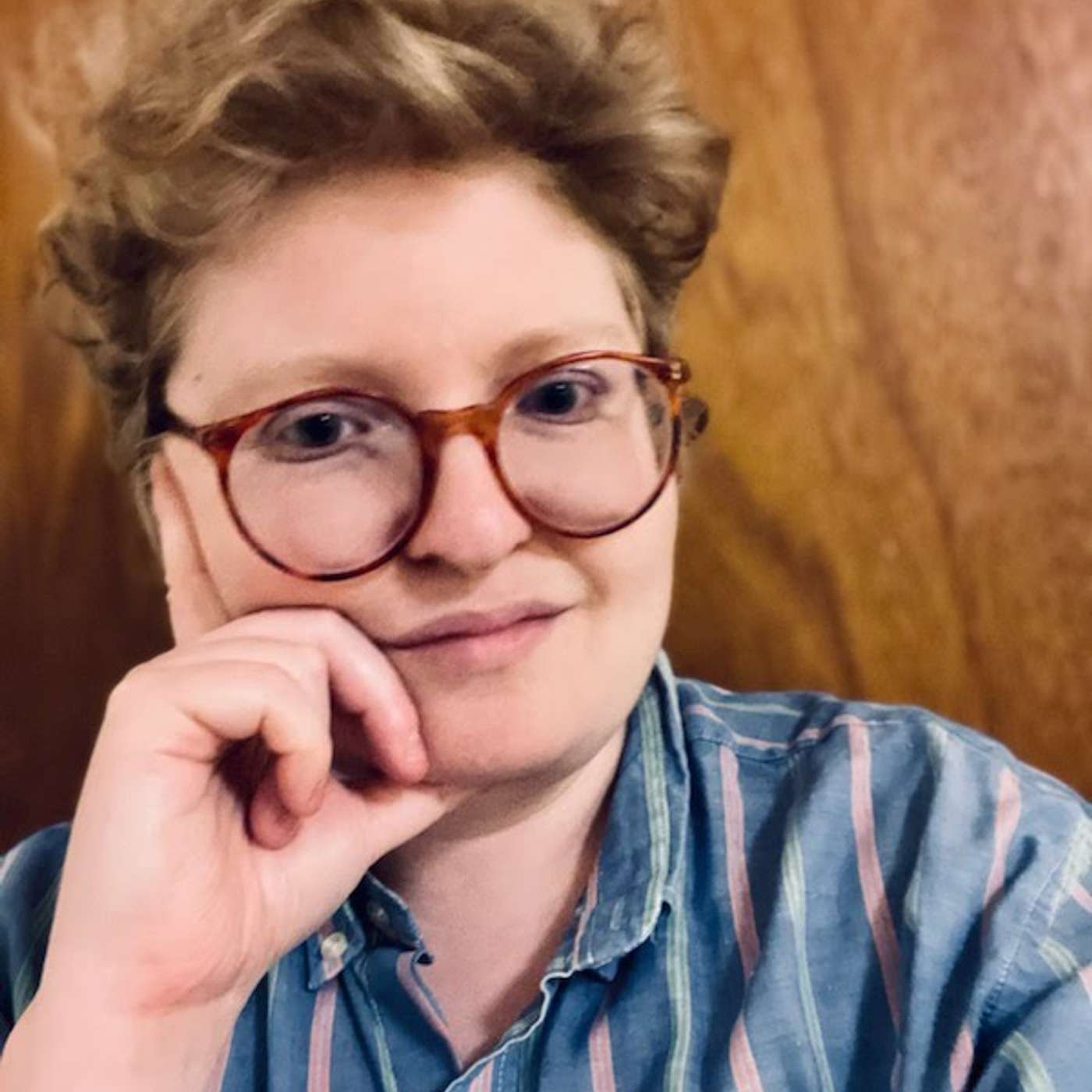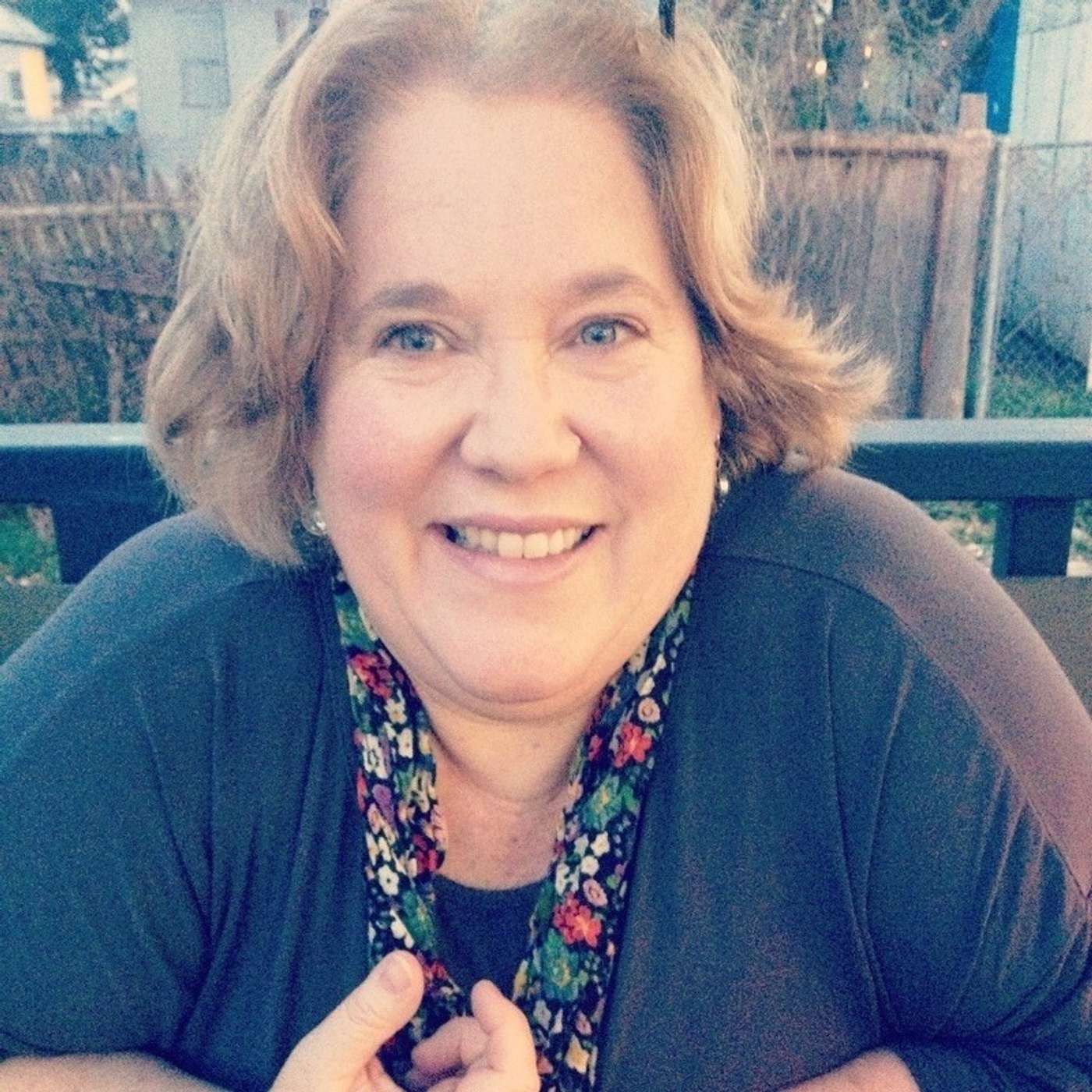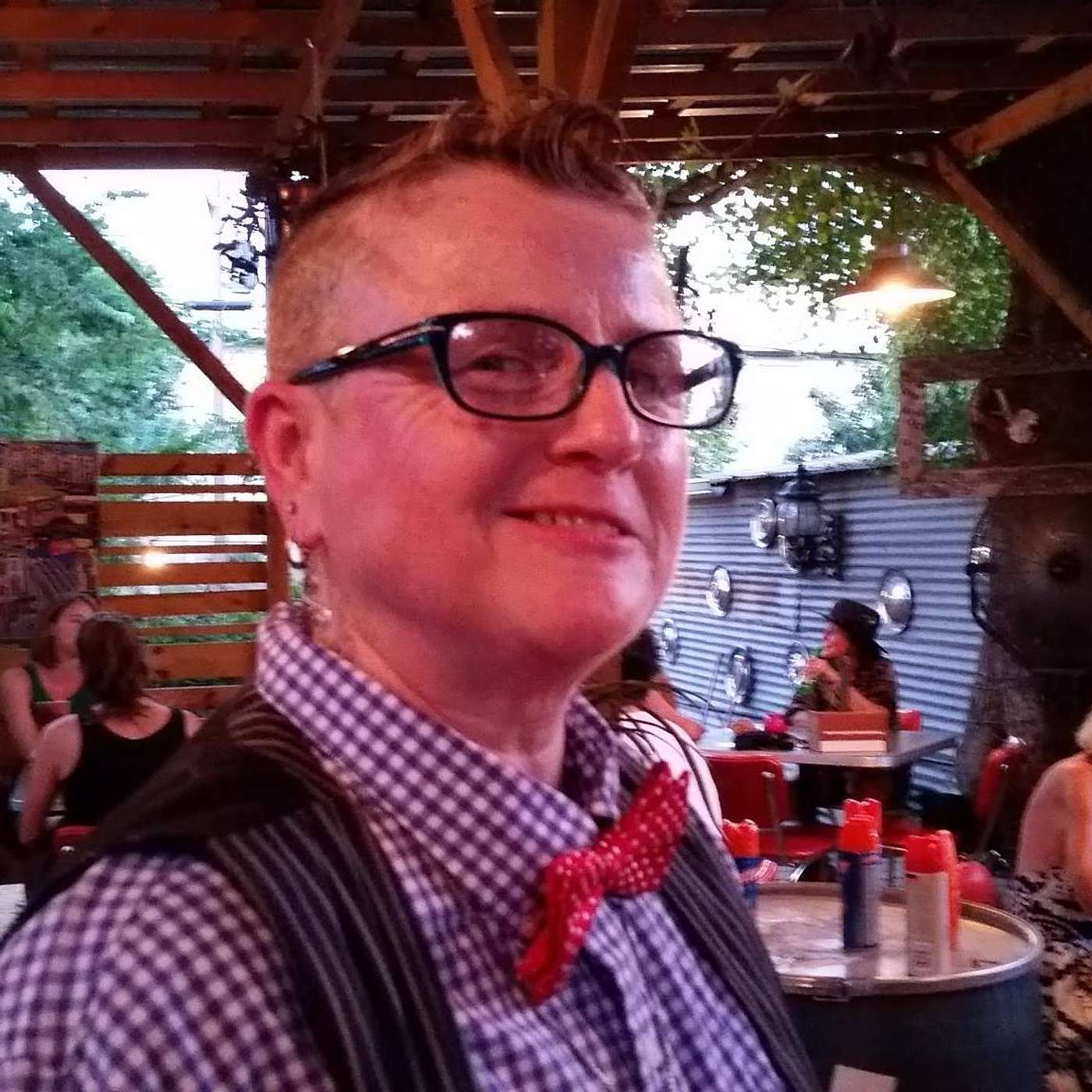
True Tales by Disability Advocates
Where advocates harness the power of storytelling to build community with their peers and hope to develop empathy in others. A team of disability advocates creates this True Tales podcast to share personal stories by disabled storytellers and add their voices to the growing community of podcast listeners.
True Tales by Disability Advocates
New Normal
To listen with full transcript, go to https://truetalesbydisabilityadvocates.buzzsprout.com/
In this episode, host Joey Gidseg talks to Jennifer Howell about her story, “From Ally to Self-Advocate.” Jennifer describes going from being the daughter of parents with disabilities to becoming someone with disabilities of her own, and the surprising things she learns along the way. Even for someone long familiar with disabilities, actually becoming a person with a disability of her own was for Jennifer a through-the-looking-glass kind of experience. Her story sparks an impassioned discussion between Jennifer and Joey, edited by Toby Al-Trabulsi and Ms. Boye, with script and production work by Kristen Gooch and John Beer.
Jennifer Howell
Jennifer Howell's lifetime of personal experience with disability – as a caregiver, teacher and person with disabilities herself – has led to her work as an accessibility and creative placemaking consultant. She is a special education teacher, published author, award-winning artist and online instructor to students around the globe, ages 4 to 94. As an Accessible Yoga Ambassador, she has led classes for over a decade for seniors and persons with disabilities. Her other curricula include hand-lettering and cursive handwriting, and sustainable fashion. Jennifer is a member of IAMPETH (International Assoc. of Master Penmen, Engrossers & Teachers of Handwriting) and the Climate Reality Leadership Corps.
Jennifer can be reached at https://www.linkedin.com/in/jennifer-howell-3179248/
Joey Gidseg
You can connect or keep up with Joey on their Facebook, Twitter or Linkedin:
https://www.facebook.com/joeygidsegfortexas/
https://twitter.com/joeyinatx
https://www.linkedin.com/in/joeygidseg/
Learn more about closing the justice gap at https://www.justiceinreach.org/
For more details about our programs go to Art Spark Texas, True Tales Podcast Page.
Welcome to True Tales by Disability Advocates, authentic voices of people thriving with disabilities. Where individuals use the art of storytelling to change the world. The True Tales by Disability Advocates podcast is produced by Art Spark, Texas Speaking Advocates Program. Keep listening to hear how life's challenges can spark a desire to speak out and advocate for themselves and others.
MsBoye:Welcome to"New Normal", Episode, Seven of True Tales by Disability Advocates. The podcasts, where advocates harness the power of storytelling to build community with their peers and hope to develop empathy in others. A team of disability advocates creates True Tales to give voice to the personal stories and lived experience of disabled storytellers. We offer our unique and often underrepresented perspective to the growing community of podcast listeners, worldwide. According to the CDC, one in four Americans live with some kind of disability and that's about 61 million adults with 61 million experiences and points of view about what it means to live with a disability. Here Art Spark, Texas we recognize that everyone's life is enriched by the inclusion of multiple voices and we have been training disability advocates as storytellers for over 20 years. In this episode, we have only one storyteller, Jennifer Howell. While we were recording this it became clear to the production team that the rapport between Jennifer and host Joey Gidseg, was giving us a unique window into the healing power of storytelling. Joey's insight and Jennifer's honesty and vulnerability reveal the powerful difference between being a disability rights ally and having the lived experience of disability and growing into self advocacy. We hope that the story and their conversation bring you new insights and a gently challenges you to begin your next journey into self-awareness.
Joey:Our guest, Jennifer Howell shares her story"From Ally to Self-advocate" about growing up in a disabled household as an able-bodied individual and becoming disabled later in life. Welcome Jennifer. Before you share with us, would you please let our listeners know what led you to The Speaking Advocates Program?
Jennifer:Of course. I was familiar with all the wonderful things that Art Spark Texas was doing, and then in 2020, I learned about The Speaking Advocates Program as well. It's been a goal of mine for a while now to make advocacy for persons with disabilities a, topic for blogging and freelance writing. So when I learned about The Speaking Advocates Program, I thought,"Hey, public speaking and podcasting are other avenues for sharing these kinds of stories." So I got involved.
Joey:That sounds like a perfect fit for you Jennifer. Let's hear your story. Jennifer, the floor is all yours.
Jennifer:Thank you, Joey. As the daughter of parents with disabilities, I have always had a heightened sense of awareness of the struggles and needs of those who are disabled. I adored and respected my mom and dad and considered myself to be extremely sensitive and empathetic of their daily experience with pain and discrimination. And I was... to the best of my awareness and understanding at the time. In Dad's case you couldn't tell at first glance that he was a polio survivor yet after a while, an observer could easily see that one leg and foot were shorter than the other. I know this affected the way he was treated at times. On one hand, there were bullies who made fun of him. On the other hand, some people reacted with compassion. There were also the times he wasn't hired for a job or was pitied because his body wasn't"normal". My mother's experience was different. She had slurred speech and balance problems. This was certainly visible to others, but it was often misinterpreted. It was not clear just by looking that she had a brain tumor. So to other people, she did not automatically fit the label of disabled more than once someone asked if my Teetotaller mom had a drinking problem. My heart was filled with sadness and pain at their assumptions and judgements. If they only knew. Even though the two who brought me into this world spent months of their life as hospital patients and depended on crutches and wheelchairs to aid their mobility. Even though I had spent a lifetime at their side witnessing their circumstances. It was not until I began inhabiting my own disability that I could start to truly imagine the world from their perspective. I realize my experience of disability is more like my mom probably, in that there is something visible yet easily, misinterpreted. I walk slowly and limp and the limp tends to get worse the longer I'm standing or walking. And urrg! I don't wanna tell everyone I meet,"Hello, I'm Jennifer. I have arthritis deformed bones, bone on bone, and I'm in so much pain that I can barely concentrate on this conversation that I'm trying to have with you right now. They have no idea that I have a medical diagnosis. Then I think,"Why should I have to explain myself? Make excuses for who I am and how I move through the world?" As you can tell, this is something I'm still coming to terms with. As I grow into my new identity as a woman with a disability. These days, I notice details about the world around me that did not catch my attention before. For example, I love the Ellen Show, but to the best of my recollection of all the audience members chosen to play a game on stage, not one has been in a wheelchair or had another visible disability not even once. And on a weekly basis, Ellen and her sponsors make lavish donations to single moms with financial difficulties, persons who have survived, natural disasters or individuals battling illnesses, or some other adversity. Oftentimes these recipients of her generosity might wheel themselves across the stage or have some type of disability. I'd ask myself and my family."Why is it then that an entire segment of the population is left out of the fun games on the show?" It's incredible to me that someone is groundbreaking and liberal as Ellen can simultaneously reinforce such a Victorian view of disability. More and more these days I attend events in which I choose to sit and wait in the food court or on a bench near the doorway or in one of those recliners at the mall that massages your back if you insert coins. I don't want my friends or family members to endure my slow limp, especially if they're in a hurry. As I sit there feeling a bit left out. I wonder if this new normal is what my parents and my friends with disabilities have been feeling all along. Even though every day I navigate a world, not designed with me in mind. I'm not likely to ask for accommodations. I mean... accommodations are for those people with real disabilities. Not for me. I'm not that bad. My disability isn't as bad as theirs. I'll be fine. I'm not sure if these thoughts of mine are internalized ableism, my resistance to making an awkward fuss or my use of denial as a coping strategy. But I do know that awareness is the first step towards change. It's a step I'm willing to take, even though I know it might come with pain. It's a step toward learning to be as good an advocate for myself as I've been for my family and friends all my life. Yeah. I'm worthy of that.
MsBoye:Here's the conversation between Joey and Jennifer about her story From Ally to Self Advocate."
Joey:Jennifer. What did you learn? Did you learn, uh, gosh, there's so much you probably learned, but what is one thing maybe that you feel like you learned as a child growing up in a disabled household?
Jennifer:Well, one thing I think that I've, I'm kind of observing and analyzing it here, um, in recent years, looking back that, um, my father handled his, um, situation, uh, dealt with his physical disability in a much different way than my mother. However they were, they were both fiercely independent. So, uh, I'm sure that that made an impression on me. But I, I'm learning that we're all unique and so we are dealing with our personal situation in the best way we know how. And, and each of us differently because we all are unique and have our own personality. I know that my dad, uh, he never really wanted to bring any attention to himself or his disability. So I don't, I don't know if it was really denial. Um, but that was, that was his way. Actually, now that I think about it, I think my mom dealt with hers a lot that way too, not, not as much. Um, I am seeing now, um, when I've been asked, uh, the question why don't I allow others to give me the same care and respect and attention that I have given to people in my family and friends, um, who have disabilities. What is it that, um, why is it that I won't allow them to give me that same care or, err, respect? And this is something that I'm going to have to, ha, think about. Probably it's going to take me a while to work through this and uh, what my thoughts are about it
Joey:Jennifer, Jennifer, there's so much there. There's so much there. I wanna. I wanna say that, society creates so many barriers that exclude us from so much already and hearing your story about how you exclude yourself from just enjoying things with your friends and your family, because you don't want them to know that you might need accommodations makes me feel really sad. I think if you say to them,"Hey, I wanna walk around. I want to hang out with y'all. Can you just walk at my pace? You know, things for me, they're a little different than they are for you, but we can still have fun together. Just stay by my side, walk at my pace and let's go shop. Let's go look around." They don't know why you don't feel social or, or like looking around like you used to before you became disabled and they don't know what's happening. So I know that they want to be, they want to spend time with you and they want to be happy with you because they love you. And when you give them that chance, by letting them know, you're giving them such a gift, because now they know how easy it is to make inclusion possible for someone they love. And for others, they don't know yet. Right? Jennifer, can I ask, what do you think would happen if you asked them or you, you explained this to them?
Jennifer:(Laughs) Well, I'm thinking about it just now, uh, with you asking me these questions. Um, It's really my own fault. I'm I mean, talking about this subject. Um, I'm sure that my friends would be more than happy to slow down for me(laughs). It's my own fault of, I guess, having too much pride to ask or, you know, to be honest. Boy I'm really shared my true feelings here, but that's really probably, it's more my own issue than theirs. I, I have some really great friends and some, and some people that love me a lot and I'm sure would do anything for me and would probably be happy to walk at a slower pace. I, uh, the more I think about it now, um, I'm sorry that I didn't give them the opportunity to do that. And I'm sorry that I didn't give myself the opportunity to just be honest with them, um, that I have these needs and that I can't keep up with them. Um, I mean, in the, in the pace of walking or, or whatever the situation is, climbing stairs or, um, whatever is, um, uh, keeping me from being a part of certain activities. I, I realize now that, um, I should have been more open and honest about, uh, what my... what I was going through.
Joey:Well, you know, you never know until, you know, and this is a new, this is a new identity for you. You're coming into your, your new identity as a self-advocate. The point of what I want to say is you know, like our existence itself is, is political. And it's never too late to start to give them that opportunity and to start letting in your, your friends and your family. This is the, the easiest accommodation, right? You know, to just match your pace or to just find a different route or find an accessible entrance. It really is a huge gift and you'll find that people who love you and care about you, they'll be more than happy to do that. Without, without hesitation, right? And, and even, even more than that, um, now in their brains, they're making that connection. And then they'll start thinking about that and becoming aware of others, being different from how they are, and just needing variations on, you know, what everybody else has with access, right? In the society that's built for them. I don't know. I'm actually kind of excited for you to try it. Uh, I think you'll be really, I think it'll be a really big, big thing for you to see how everyone is there for you. Um, I'm excited for you.
Jennifer:Well, thank you. Thank you. I just, I, um, remember at some point in time it was just like a light bulb went off, that I thought I can't believe that I, I grew up in a household with persons with disabilities and that uh, there was so much, I never noticed. There was so much, I never... I don't know for whatever reason I wasn't aware of things until I was experiencing them, myself.
Joey:And, you know, Jennifer that's the other thing about your story that really struck a chord with me was, you know, we always hear people, people who are not disabled, um, saying, writing everywhere in our field, everywhere in the disability field, right? Saying that they know the disabled experience. They know people with disabilities better than we know ourselves. And I think what's so fascinating for me about your story is that you haven't always been disabled. And so you remember life before you were disabled and now you're learning life as a, as a disabled self-advocate. And you've been able to, to explain and point out this like really huge gap in, in, uh, knowledge and understanding of the disabled experience between disabled self-advocates and our allies, right? Um, and that's huge because that's just never talked about. Uh, so I want to thank you for sharing that because you're the first actually, and it's validating because we see that it, it it's real and it exists, right? So....
Jennifer:It was almost embarrassing to me that I hadn't noticed before. Um, but, it really is different when you are personally experiencing it, it gets really different. And so this was such a big moment for me to realize that. That I really wanted to share it with other people. I know that sounds like a contradiction now, from what I'm saying, I don't, I can't even tell my friends that they need to walk more slowly. Um, I don't know, I'm, I'm still working through all of this, but I, I know that I had this moment where I felt like I want everyone to know that the, the, the, the barriers that persons with disabilities face, um, you know, just wanting to go to a restaurant or, or, um, transportation or, or like me going, er going to the mall and having to sit in the food court because you feel like you just can't, er, err, it's just too difficult to maneuver, um, a situation like shopping. So, um, I've I felt like I wanted to crusade for that cause and, um, I'm realizing now that I'm, I wasn't even crusading for myself. Um... You know, it's really been eyeopening,
Joey:Jennifer. I would give yourself more credit because this is, this is authenticity, right? That's what this podcast is about. This is part of the journey is, is realizing that, you know, what, if an accommodation makes something easier for me to access, then why would I deny that for myself? If, if something is possible for me and all I have to do is ask for it and advocate for it, and there's a chance maybe I'll get it. It's always worthwhile because it doesn't just impact you. It impacts the people that are coming after you, you know? And, um, Jennifer, what impact do you hope your story has on our listeners?
Jennifer:Well, many people, myself included may mean well, but are unaware or oblivious to the discrimination and ableism of which they are themselves participants. Even though no one can fully understand unless they themselves are disabled. I'm hoping listeners will take a moment to be more aware and to follow the lead of the disabled advocates who are the experts.
Joey:Thanks so much, Jennifer, for joining us today and letting us have a look into your experience growing up and as a self advocate today. We'd love for you to come back and let us know more about your journey into self-advocacy. If people wanted to connect with you, what is the best way for them to do that?
Jennifer:Well, err, thank you. I, um, I'd like to refer them to my LinkedIn, Jennifer Howell, H O W E L L. And thank you all so much.
Joey:Thank you!
MsBoye:Thanks for listening to this episode of The True Tales by Disability Advocates. If you were touched by the issues covered in this episode, please share your experience with us on our True Tales Podcast, Facebook page."New Normal" was hosted by Joey Gidseg and produced by Jon Beer, edited and mixed by me. Ms. Boye. Special thanks to Jennifer Howell for being our guest for this episode. The script and production team also includes Kristen Gooch and Toby Al-Trabulsi. John Beer is the voice of the podcast intro and outro. I'm MsBoye the coordinator of The Speaking Advocates Program at Art Spark, Texas, where our goal is to spark the creative in everyone. This has been Episode Seven of True Tales by Disability Advocates, and if you enjoyed the show, please share it with your friends and allies. And of course, don't forget to follow us on Facebook, Instagram, Tik-Tok and Twitter for details of future episodes.
John Beer:All episodes of the True Tales by Disability Advocates are free on Apple podcasts, Spotify, and anywhere you get your podcasts. The program is funded in part by a grant from the Texas state independent living council, the administration for community living and individuals like you to learn about The Speaking Advocates Program. Sign up for our newsletter at Art Spark, Tx.org. That's A R T S P A R K T X dot O R G. The free virtual training is open to people of all disabilities, no matter where you live.





.jpg)







